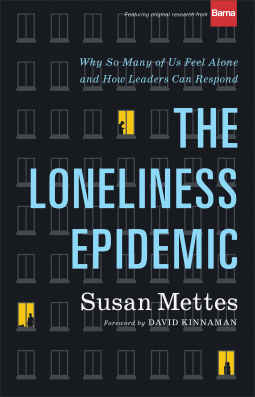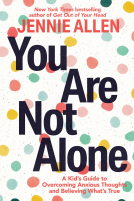
The Loneliness Epidemic
Why So Many of Us Feel Alone--and How Leaders Can Respond
by Susan Mettes
This title was previously available on NetGalley and is now archived.
Send NetGalley books directly to your Kindle or Kindle app
1
To read on a Kindle or Kindle app, please add kindle@netgalley.com as an approved email address to receive files in your Amazon account. Click here for step-by-step instructions.
2
Also find your Kindle email address within your Amazon account, and enter it here.
Pub Date Nov 30 2021 | Archive Date Jan 29 2022
Baker Academic & Brazos Press | Brazos Press
Talking about this book? Use #TheLonelinessEpidemic #NetGalley. More hashtag tips!
Description
Guided by current research from Barna Group, Mettes illustrates the profound physical, emotional, and social toll of loneliness in the United States. Surprisingly, her research shows that it is not the oldest Americans but the youngest adults who are loneliest and that social media can actually play a positive role in alleviating loneliness. Mettes highlights the role that belonging, friendship, closeness, and expectations play in preventing it. She also offers meaningful ways the church can minister to lonely people, going far beyond simplistic solutions--like helping them meet new people--to addressing their inner lives and the God who understands them.
With practical and highly applicable tips, this book is an invaluable tool for anyone--ministry leaders, parents, friends--trying to help someone who feels alone. Readers will emerge better able to deal with their own loneliness and to help alleviate the loneliness of others. Foreword by Barna Group president David Kinnaman.
Advance Praise
“I have worked alongside Susan on numerous projects with Barna Group over the years. I am especially grateful for her careful, nuanced, and biblical approach to problems, as she demonstrates here in this important book. . . . If you’re experiencing loneliness or know someone who is—or if you work in churches, schools, companies, or organizations where there are human beings (yes, that’s pretty much all of us)—you should know what ideas are circulating about the crush of loneliness and the buffering of healthy relationships. Susan helps us to close these gaps.”—David Kinnaman, president, Barna Group (from the foreword)
“If you’re not aware we face a loneliness epidemic, you will be fully informed by the end of this stats-packed book. But Susan Mettes doesn’t just highlight the problem; she also busts myths and offers a host of practical ways that leaders can help build communities of belonging. I’m eager to put these tips into practice.”—Collin Hansen, vice president of content and editor in chief, The Gospel Coalition; host of the Gospelbound podcast
“I’ve never read a book that so eloquently elucidates the landscape of loneliness. Susan Mettes’s analysis of our loneliness pandemic is as thought-provoking as it is practical. You will come away from this book feeling inspired and equipped to help transform loneliness into belonging.”—Michelle Ami Reyes, vice president, Asian American Christian Collaborative
“This is an important book for so many reasons. Susan Mettes and Barna Group are to be commended for their myth-busting, data-driven analysis of loneliness. As a scholar-pastor who has spent much of his life studying—and trying to cultivate—Christian community, I found my assumptions about loneliness challenged at many points. But I also found much hope in the book’s thoughtful suggestions for ways we can alleviate the sense of aloneness and isolation experienced by Christians and non-Christians alike.”—Joseph H. Hellerman, author of When the Church Was a Family and Why We Need the Church to Become More Like Jesus
“As a single woman and a recent empty nester, I was eager to understand more about feelings of loneliness that I’ve been slow to acknowledge. The thorough research and insights Mettes offers, as well as a solid theological foundation, helped me to wrap my mind around the roots and remedies for the loneliness that is rampant in our culture. I highly recommend this book both for those who feel the sting of loneliness and for the ones who love us.”—Margot Starbuck, author of The Grown Woman’s Guide to Online Dating
Available Editions
| EDITION | Other Format |
| ISBN | 9781587434778 |
| PRICE | $22.99 (USD) |
| PAGES | 224 |
Average rating from 5 members
Featured Reviews
 Conrade Y, Reviewer
Conrade Y, Reviewer
Is loneliness a problem? Consider the research data. A third of American adults admit they are frequently lonely. Within the past two decades, feelings of loneliness have more than doubled. Nearly half of all practicing Christian Millennials have experienced it too. Moreover, the problem is growing, not just in North America but globally. Come Winter, the problem deepens. Rates of depression and suicide continue to rise. Why is this happening? In short, it is due to a lack of meaningful relationships. In pre-pandemic days, loneliness has been a rising concern. In 2020 when the world goes into lockdown, everyone starts to talk about the challenges of loneliness and mental health. Research from the Barna group offers compelling evidence on the extent of the problem. This leads to several other problems such as the lack of intimacy, fewer trust relationships, isolated lives, and other crises pertaining to human relationships. So widespread is the problem that even churches are full of lonely people. So why are people lonely? How is it that even people of faith who go to Church can be lonely? What can we learn from the statistics gathered? How can we address this problem? Is loneliness a Western phenomenon or is it more global? In Part One, Author and Professor Susan Mettes defines loneliness as "the distress someone feels when their social connections don’t meet their need for emotional intimacy." She distinguishes this from "social isolation" and "solitude." The former is about circumstances often unforeseen. The latter is about being alone. In Part Two, Mettes goes into greater detail about factors influencing loneliness such as:
- AGE: It's a myth that older people are lonelier. Younger people are most lonely
- ROMANCE: It's a myth that those who found "true love" are not lonely. Poor quality relationships can lead to deeper levels of loneliness.
- INSECURITY: It's a myth that loneliness is due to poor social skills. In fact, feelings of insecurity are among the major reasons why people are afraid to connect or to open up.
- SOCIAL MEDIA: It's a myth that too much time online on social media makes one lonely. Truth is most people on social media are already lonely in the first place. Social media only accelerated that.
- FAITH AND CHURCH-GOING PEOPLE: It's a myth that Churchgoers are not lonely. Truth is, everyone regardless of faith is experiencing greater loneliness.
- PRIVACY: It's a myth to think that just because people are paying attention, we won't feel lonely. Sadly, our inability to differentiate attention from our intimacy creates uncertainty in our relationships.
In Part Three, Mettes suggests four ways to deal with this "loneliness epidemic."
1) Establish a sense of BELONGING
2) Cultivate CLOSENESS in relationships
3) Manage EXPECTATIONS of others and self
4) BREAK THE CYCLE of unhealthy stereotyping of what loneliness is, and what leaders could do.
My Thoughts
==============
Loneliness is a problem often swept under the carpet conveniently and frequently. Like an ostrich that buries its head upon seeing a dangerous predator, it is only a matter of time before the loneliness animal devours our self-esteem. That is why books like this are crucial wake-up calls to all. Supported by empirical data, coupled with decades of research, author Susan Mettes gives us a helpful understanding of the problem of loneliness, the pervasiveness of myths surrounding loneliness, and the need to do something about it. Let me address three groups of people facing loneliness and how this book can help them.
Firstly, for the general public, notice how the findings in the book transcend religion and generations. Just like how the coronavirus turned into a pandemic, it is hoped that the problem of loneliness will NOT mirror that. Otherwise, it is highly probable that if left unaddressed, such loneliness "epidemic" would accelerate toward a pandemic level. Mettes shows us how loneliness cuts across all age groups and religious affiliations. That brings us back to the problem of original sin, which essentially cuts off our relationship with God. Even Christians are still suffering from this state of brokenness.
Secondly, with the statistics clearly showing that younger people nowadays are much lonelier than others, the age-based data is a snapshot of the past few decades. This means that the curve would shift as the group ages. Thus, to say that young people now are loneliest does not necessarily mean the next generation's set of young people will be equally lonely. We still do not know how things will turn out. However, we can use this as a teaching tool to guide our education. How can we nurture those who are under 10? Can we learn the lessons today in order to help them cultivate healthy relationships? Churches should wake up and embrace this challenge. Young people ministry is never more urgent!
Finally, to leaders. It is well-known that those holding leadership positions tend to be lonely. It comes with the job. Thankfully, Mettes have some guidance for this group. Learn from Jesus, how he develops multiple friendships in spite of him being a sought-after Rabbi, Teacher, Master, and Leader. Adopt strict discipline in our use of technology. Fight against loneliness by participating in justice matters on behalf of communities. These and many more should make this book a powerful read and necessary resource to battle one of the biggest challenges of our generation, and generations to come.
Still, one of the best reminders that the author gives us is that we ought not see loneliness as altogether a bad thing. Out of such a state, we have seen tremendous creativity and honest reflections. The problem in our world is that the state of loneliness has tilted toward an unhealthy level. Our goal is not eradication nor balance. Our goal is the restoration of healthy relationships that recognize the need to push forward to meet or to pull back to rest.
Susan Mettes (MA, Duke University) is a behavioral scientist with extensive prior experience conducting research for faith-based organizations, including Barna Group, Thrivent Financial, and World Vision. She is an associate editor for Christianity Today magazine and has written dozens of articles for Christianity Today and other publications.
Rating: 4.75 stars of 5.
conrade
This book has been provided courtesy of Brazos Press and NetGalley without requiring a positive review. All opinions offered above are mine unless otherwise stated or implied.
It’s not really a newsflash: our atomized society has led to significant increases in loneliness.
In The Loneliness Epidemic: Why So Many of Us Feel Alone and How Leaders Can Respond, Susan Mettes explores research from Barna about various groups and loneliness, explains the results, and considers what might be able to be done about it.
The author began with loneliness in America and defining loneliness, reminding everyone some solitude is good and healthy, but in our society a good number of people feel very much isolated and alone. She compares and contrasts the stereotypes about loneliness with what survey results show in terms of age, romance, insecurity, social media, faith, and privacy: the oldest prove more lonely than might have been imagined, as well as many within romantic relationships and even those who go to church, although churchgoing in general was associated with lower levels of loneliness.
She then considers what people can do in order to avoid or mitigate loneliness, and it involves finding one’s community into which one belongs, being close to a few but not necessarily many people, establishing healthy and appropriate expectations with oneself and one’s relationships, and encourages people in breaking out of a loneliness cycle.
The author also well noted how loneliness is not inherently a problem to solve; as Jesus left the crowds at times to go and pray to His Father alone, so we all could use a little time to ourselves. Yet, as with all things, a bit too much alone time, and social isolation, can prove extremely challenging and difficult for people to navigate, and the evidence for this is all around us.
Man was not made to be alone; our emphasis on (philosophical) liberalism and the elevation and exaltation of the individual inherent therein has, by necessity, loosened and frayed communal bonds, and we are being powerfully reminded how humans are indeed social creatures. Hopefully, at some point, our society in general will turn back toward community; until then, as Christians we do well to foster community among the people of God and make good on our professed association as brothers and sisters in Christ.
Readers who liked this book also liked:
Harold Earls, IV; Rachel Earls
Biographies & Memoirs, Parenting, Families, Relationships
Paula Skaggs; Josh Linden
Entertainment & Pop Culture, Nonfiction (Adult), Self-Help


















